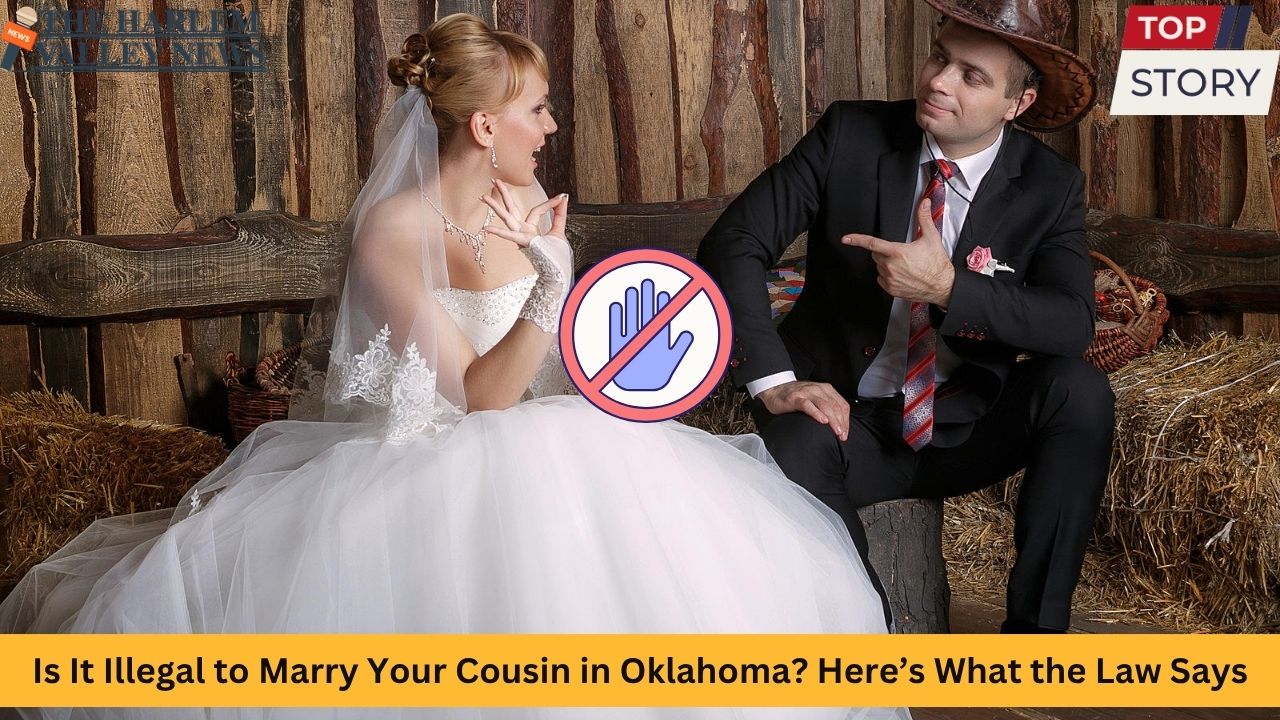Marriage laws often vary widely from state to state, especially when it comes to relationships involving blood relatives. If you’re considering marrying a cousin in Oklahoma, it’s crucial to understand what’s legal, what’s not, and the underlying reasons for these laws. This comprehensive article dives deep into Oklahoma’s stance on cousin marriages, covering legal details, the reasoning behind the legislation, exceptions, and how Oklahoma’s approach compares to the rest of the United States. Throughout, we’ll explore cultural perspectives, cite major cities like Oklahoma City, Tulsa, and Norman, and discuss the rare exceptions some families in the Sooner State encounter.
The Legal Status of Cousin Marriage in Oklahoma
In Oklahoma, marriage between first cousins is explicitly illegal. The state statute defines marriages between certain close relatives—including first cousins—as incestuous, void, and strictly prohibited. Anyone attempting to legally marry a first cousin in Oklahoma City, Tulsa, Norman, Broken Arrow, Lawton, or any other municipality within the state will find it impossible to obtain a marriage license for such a union.
This ban applies to both ceremonial and common-law marriages, and the law is enforced equally in both urban and rural counties throughout Oklahoma.
Understanding Consanguinity: Who Counts as a Cousin?
The law regulates marriage based on the concept of consanguinity, meaning how closely two people are related by blood. Here’s a quick overview:
-
First Cousins: Share a set of grandparents; child of your aunt or uncle.
-
Second Cousins: Share great-grandparents but have different grandparents.
-
Half Cousins: Share only one grandparent due to half-sibling parents.
In Oklahoma, the ban on marriage extends specifically to first cousins but not to more distant relatives. That means second cousins and beyond are legally permitted to marry in the state.
The Law in Action: Oklahoma Statute and Enforcement
The Oklahoma Statutes, under Title 43, Section 2, clearly state:
“Marriages between ancestors and descendants of any degree, of a stepfather with a stepdaughter, stepmother with stepson, between uncles and nieces, aunts and nephews … and first cousins are declared to be incestuous, illegal and void, and are expressly prohibited.”
Attempting to violate this law isn’t just ceremonially invalid—the marriage would have no legal standing. In effect, even if a wedding is held, the couple would not be married under law, and none of the rights or responsibilities of marriage would apply.
Enforcement: County court clerks in cities like Tulsa and Oklahoma City are required to deny marriage licenses to couples who are first cousins. Any attempts to circumvent the law could result in legal penalties for providing false information.
Recognized Exceptions: Marriages Performed Out of State
A unique nuance in Oklahoma law is the recognition of cousin marriages legally performed outside the state. For example:
-
If first cousins travel to a state where such marriages are permitted (such as California, Colorado, or New York), get married there, and return to Oklahoma, their marriage will be recognized as legally valid within Oklahoma.
-
This loophole is crucial for families with cross-state ties or those who move to the state after marrying elsewhere.
However, this recognition only applies if the marriage was valid according to the out-of-state jurisdiction. Attempting to marry in Oklahoma remains illegal.
Why Are Cousin Marriages Banned? The Historical and Scientific Perspective
Historical Context: During the late 19th and early 20th centuries, many U.S. states introduced bans on cousin marriages, motivated by:
-
Concerns over possible genetic risks to children born of closely related parents.
-
Social stigmas rooted in religious or cultural beliefs.
-
A desire to “modernize” marriage laws.
Scientific Concerns: The main argument against cousin marriages has always been the increased risk of certain genetic disorders. Interestingly, recent research suggests that, while the risk is elevated compared to unrelated couples, it is often not as great as popularly believed. For instance, the overall risk for birth defects in children of first cousins is 4-7% compared to 3-4% in unrelated couples—a measurable but not enormous difference.
Moral and Cultural Arguments: In Oklahoma, as in many southern and midwestern states, cultural beliefs and social norms continue to influence legal attitudes toward cousin marriage.
How Oklahoma Compares to Other States
The U.S. provides a patchwork of laws on cousin marriage:
| State | First Cousin Marriage Legal? | Notable Cities |
|---|---|---|
| Oklahoma | No | Oklahoma City, Tulsa |
| Texas | No | Dallas, Houston |
| Kansas | No | Wichita, Topeka |
| California | Yes | Los Angeles, San Diego |
| New York | Yes | New York City, Buffalo |
| Colorado | Yes | Denver, Colorado Springs |
In total, about 24 states ban first cousin marriages outright. About 19 allow them (sometimes with age or fertility restrictions), and several recognize out-of-state marriages like Oklahoma does. Every state allows second cousins to marry.
Social Attitudes and Stigma in Oklahoma Cities
In major cities such as Oklahoma City, Tulsa, and Norman, the practice of cousin marriage is rare and generally frowned upon. Social attitudes tend to strongly discourage marriage between first cousins, often equating it with taboo or inappropriate behavior. Some of these perspectives stem from:
-
Historic religious teachings.
-
Community values about family.
-
Misunderstandings about genetic risks.
While there are few published cases in Oklahoma courts about cousin marriage, the stigma is real, influencing both legal and social responses.
Data, Statistics, and Incidence of Cousin Marriage
Prevalence: In the United States, cousin marriage is extraordinarily rare. Nationally, less than 0.2% of all marriages are between first or second cousins. This is far lower than in some countries where cousin marriage can account for up to 60% of unions.
In Oklahoma specifically, there are no government statistics on cousin marriage incidence due to the outright ban, but the rates can be safely assumed to be near zero for first cousins. Second cousin marriages, being legal, occur with about the same rarity as elsewhere in the U.S.
Major City Demographics:
-
Oklahoma City (pop. 687,725)
-
Tulsa (pop. 413,066)
-
Norman (pop. 128,026)
Across these cities and their surrounding areas, cousin marriages represent an insignificant portion of total marriages, reflecting the legal prohibition and prevailing social norms.
Frequently Asked Questions
Can I marry my first cousin in Oklahoma?
No. It is illegal to marry your first cousin under Oklahoma law, regardless of the city or county.
What if I marry my first cousin in another state?
If the marriage is legally performed in a state where such unions are allowed, Oklahoma will recognize the marriage once you return.
What about second cousins?
Marriage between second cousins is fully legal in Oklahoma, as in all U.S. states.
Are there criminal penalties for marrying my cousin in Oklahoma?
If you knowingly apply for a marriage license or try to marry a first cousin, the marriage will be void and unenforceable. In cases of sexual relations or cohabitation with a first cousin, state law treats this as incest, which is a felony offense in Oklahoma, punishable by prison and sex offender registration in some severe cases.
Can step-cousins or cousins by marriage marry in Oklahoma?
Yes, provided there is no biological relationship as defined by Oklahoma’s consanguinity statute.
Conclusion
Oklahoma’s marriage laws are unambiguous: Marrying your first cousin is illegal within state lines, and such marriages are deemed void and unenforceable. The law, rooted in a mix of historical, cultural, and genetic concerns, still reflects strong social attitudes present in cities like Oklahoma City and Tulsa. However, couples who perform a legal cousin marriage outside Oklahoma are recognized as married upon their return—leaving a small, complex loophole in the law.
As Oklahoma grows and diversifies, these laws may one day evolve, but for now, anyone contemplating a cousin marriage in the Sooner State should be fully aware of both the legal and social ramifications.
If you have further questions about marriage laws or face a unique family situation in Oklahoma, consulting with a legal expert or family attorney in your city—such as Oklahoma City, Tulsa, Norman, or Edmond—is always a wise choice.
















Leave a Reply